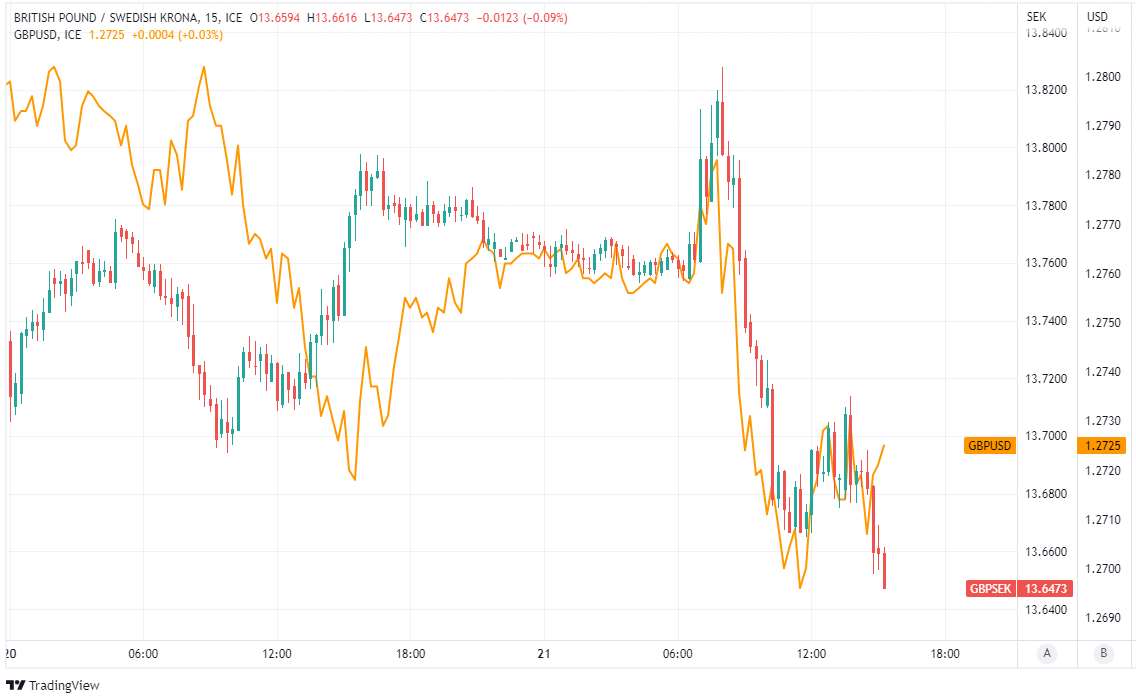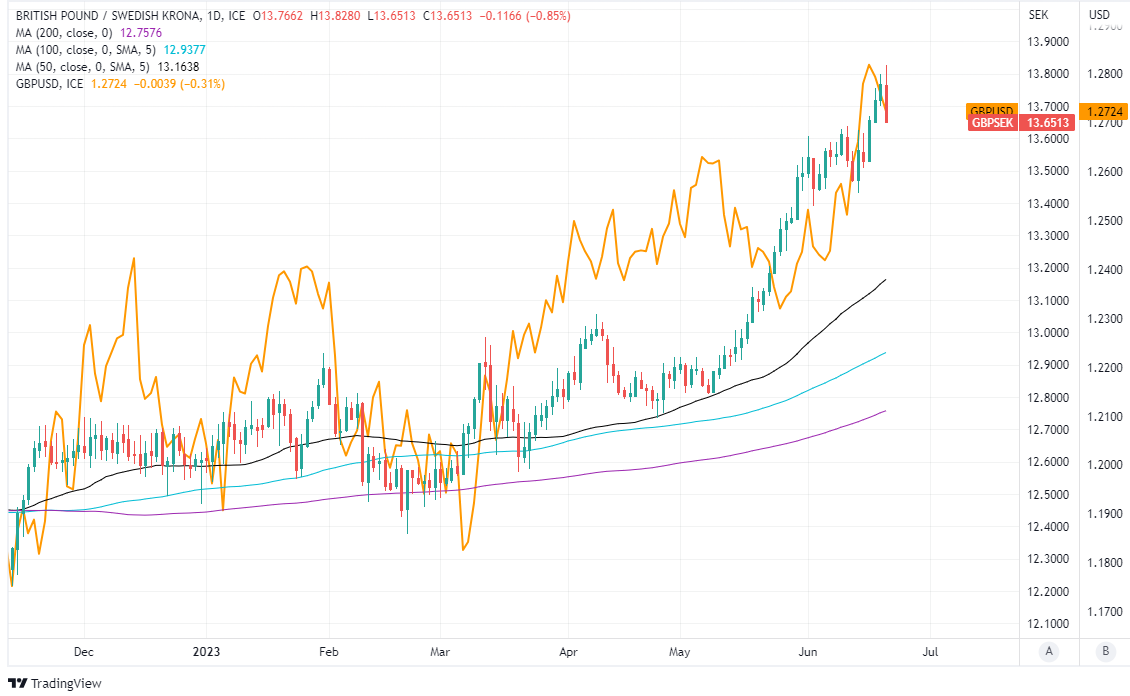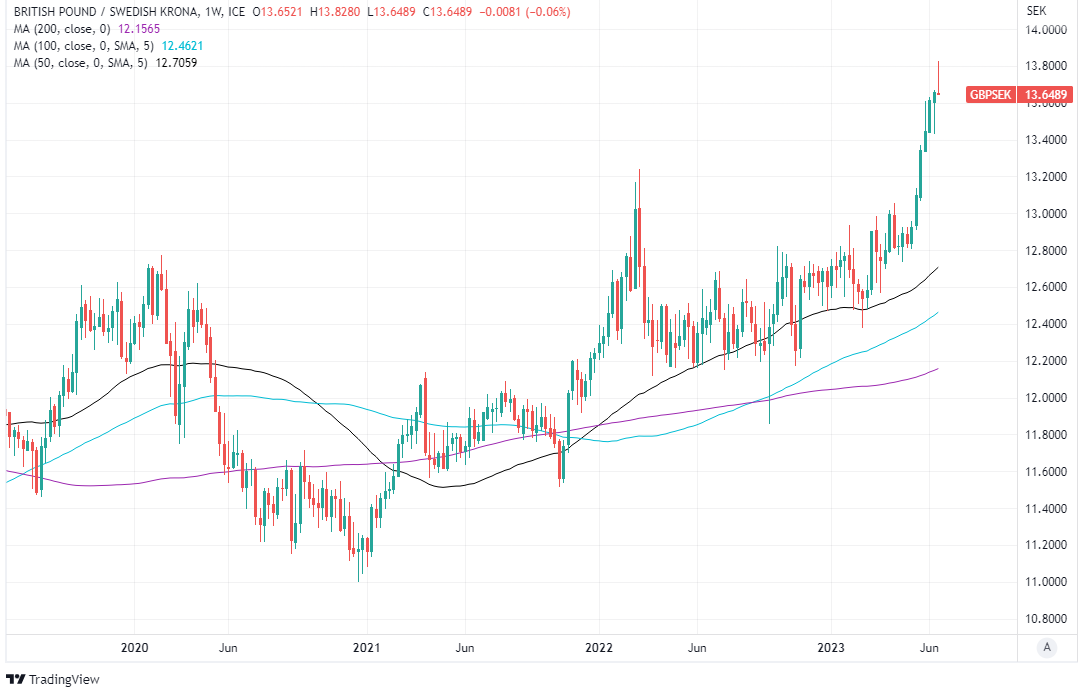Pound Risks Falling Into a Swedish Trap
- Written by: James Skinner
"The risk of no G10 central bank winning in capping core CPI to 2% beckons" BNY Mellon.

Image © Adobe Stock
Pound Sterling fell widely in midweek trade with its heaviest losses coming in relation to the Krona after a new record for core inflation appeared to stoke concerns about what might become of the UK economy as the Bank of England (BoE) and financial markets raise interest rates in order to dampen price pressures.
Sweden's Krona remained the second biggest faller in the G10 bucket for the recent month on Wednesday while also continuing to sit near the bottom of the G20 rankings but it appeared to be in the process of turning the tables on the Pound and might have further to rise in GBP/SEK if some analysts are right.
"The UK risks falling into the same trap that the Swedish Riksbank finds itself in which is persistently higher inflation with no signs of easing, growth faltering as higher rates bite, and a currency that is declining as a result and adding fuel to the fire," says Brad Bechtel, global head of FX at Jefferies.
"Then the BoE is paralyzed and GBP will start falling, as the market starts losing confidence, similar to what we saw with Liz Truss. A falling GBP would add to the inflation problem and we could end up in a doom loop from there. The only saving grace would be a turn in inflation," Bechtel adds.
Above: GBP/SEK shown at 15-minute intervals alongside GBP/USD. Click image for closer inspection. To optimise the timing of international payments you could consider setting a free FX rate alert here.
Wednesday's inflation figures suggested the UK's core inflation rate rose from 6.8% to 7.1% in May while marking a second record high on the run after climbing from 6.2% in March and its low of 5.8% in January 2023, leading market-implied expectations for the BoE Bank Rate to rise further.
Market-implied rates for year-end have since risen over and above the 5.75% that previously triggered a mini meltdown in the U.S. banking sector back in March when the failure of Silicon Valley Bank and others led the Federal Reserve (Fed) to take extraordinary measures.
These are immediately passed through to mortgage borrowing costs in the UK and were already at restrictive levels for home buyers even before the inflation release, which was evidenced by the decline in mortgage transaction values during the first quarter.
The UK rates are also now almost two percent higher than the 4% year-end level implied for Sweden's Riksbank, which has led to a months-long period of speculation about the stability of the Swedish housing market that is widely said to have been a key driver of recent losses in Swedish Krona exchange rates.
Above: GBP/SEK shown at daily intervals alongside GBP/USD. Click image for closer inspection.
"The rest of the world has focused purely on interest-sensitive households and the real estate sector disregarding the country's strong fundamentals," writes Carl Hammer, chief FX strategist at SEB, in a Wednesday market commentary.
"But our twin surpluses, low interest rates and very strong balance sheet (despite high private debt) give little help if they are not deployed in a pro-active way. Instead, Swedes have become accustomed to the krona falling and we continue to invest savings and export revenues abroad (good if SEK is on a falling trend)," he adds.
Hammer and colleagues say the market-implied scenario of a 5% Bank Rate in five years time is unsustainable and also flagged the current 15-year high in GBP/SEK as something that could soon go into reverse while Thursday's policy decision from the BoE is one prospective catalyst for a deeper correction in Sterling.
The economist consensus suggests the BoE will raise Bank Rate from 4.5% to 4.75% on Thursday but many say there is a risk of a larger increase, while mortgage and some other forms of borrowing costs have already moved far ahead of the BoE.
Above: GBP/SEK shown at weekly intervals alongside GBP/USD. Click image for closer inspection. To optimise the timing of international payments you could consider setting a free FX rate alert here.
It's not clear what the BoE will say or do, or how currency markets might be likely to respond in either of the various possible scenarios, though there will be much interest in anything the bank says about how its inflation forecasts have been impacted by the economic data coming from the UK.
"FX markets have sold the GBP after a knee jerk reaction on higher rates being insufficient and driving up other risks," says Bob Savage, head of markets strategy at BNY Mellon.
"The risk of no G10 central bank winning in capping core CPI to 2% beckons. The only notable success in reversing headline inflation comes from the FOMC - but even their core is sticky over 4%. The EU and UK subsidies on energy put fiscal concerns into play as well - as the UK det at 100% to GDP highlights," he adds.
The BoE's May forecasts suggested inflation would likely fall to around 7% by July and around 4% by year-end but it acknowledged high uncertainty about the outlook while numerous factors could yet further delay the disinflation process including prices of goods and services produced in the UK, those which are imported and commodity prices.



